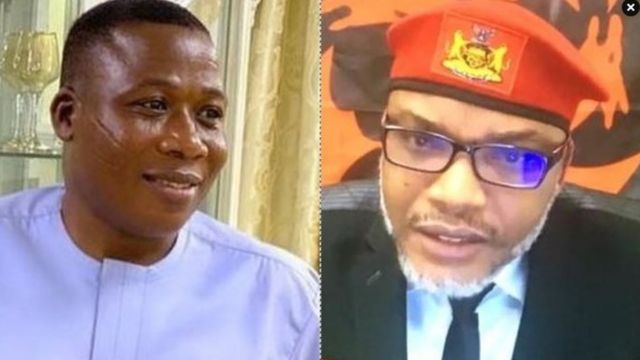This country seems to be permanently living with many touting secessionists propaganda. Only last week during the trial of the chieftain of the Indigenous People of Biafra (IPOB), Nnamdi Kanu, the media was surfeit with disinformation emanating from the usual crowd of separatists, complete with a lockdown on some states of the South East. I wish many of those with that mind-set had the experience of Ambassador Denis Ukume in the line of duty. The ambassador had the unique experience, as our envoy to Ivory Coast in 1983, to chaperone a remorseful arch-secessionist, Chukwuemeka Odumegwu Ojukwu, back to his fatherland after he was pardoned by President Shehu Shagari. This much he disclosed in his memoir titled, I Believe.
I happened to be present at the launching of the book that took place about a month ago at the International Conference Centre, Abuja. I attended the ceremony for two reasons. Firstly, Ambassador Ukume was a pioneer student of Government College, Keffi, in the first set that began in 1949 – I attended the college many years later in the mid-1960s. That set of 1949 actually began in Kaduna, because facilities in rustic Keffi were not ready yet. They remained in Kaduna for so long and only moved to Keffi in 1955, their final year. Almost all his classmates have gone back to our Maker. He would probably be the last man standing in their set and found it proper to accord him that respect by attending the celebration of his life.
Secondly, one of the books Ambassador Ukume was launching is his memoir titled I Believe which would be of great interest particularly because of the eventful days he spent as Nigeria’s envoy to Ivory Coast and his involvement in the saga that brought Odumegwu Ojukwu back to Nigeria from exile. As I found out the book is small, and a page-turner, which a determined reader could go through in a sitting. The book chronicled his life from birth in 1938 in Gboko, the traditional capital of the Tiv nation, to the journeys he undertook in the effort to acquire Western education away from home.
After secondary school he found employment in Northern Nigerian Ministry of Information, incidentally alongside Muhammadu Uwais (later Chief Justice of the Federation), Kaloma Ali (Minister of Mineral Resources) Maccido Dalhat (Kaduna State Head of Service and later Minister of Police Affairs). He had a memorable time working in the Ministry of Information then run by Ahmed Joda as permanent secretary. In the course of duty, he was privileged many times to travel, touring, with the Sardauna Ahmadu Bello, Premier of Northern Nigeria. He wrote: “Quite often I had enjoyed the rare privilege of travelling with the Sardauna in his official ultra-modern American-made Cadillac limousine as he toured various parts of the region. I would take the front seat by the driver, while Alhaji Yusuf Gobir, the Premier’s Principal Private Secretary would join him in the back seat.”
In due course the ministry got him a Northern Nigerian scholarship to study journalism in the UK. At graduation he was posted to the High Commission in London as a Senior Information Officer in the Northern Nigeria Agent General Office. When the civil war started he was recalled to the Ministry and was very much involved in the war effort. He was Secretary of the Publicity Committee of the War Council as well as manning the research department of the ministry a job that many times took him to the rear commands of the war zone. A few years after, he left the service for the greener pastures of the private sector. He worked with the Nigerian Airways in the 1970s and on return of political activities in the late 1970s he jumped into the National Party of Nigeria (NPN). Perhaps due to his closeness to Joseph Tarka, a juggernaut of the party, he was appointed the National Administrative Secretary of the NPN from whence he got deeply involved in the Shehu Shagari Presidential campaign.
President Shehu Shagari took special note of him during the campaigns and when appointing ambassadors, he purposely assigned him to Ivory Coast where Ojukwu lived in exile after the Biafran misadventure. Ojukwu had made prior contacts with the president and the special assignment of Ambassador Ukume at Ivory Coast was to conclude and safely bring back Ojukwu to Nigeria. It was an assignment that took months to accomplish and Ambassador Ukume weathered lots of intrigues particularly by those who didn’t want Ojukwu to renounce secession.
In all his interactions with Ojukwu he found him profoundly contrite. Ambassador Ukume wrote: “My first meeting with the ex-Biafran leader was on a floating restaurant on the lagoon in Abidjan. I had requested (his wife) Stella to bring him to lunch. A memorable meeting, which became emotional as Ojukwu wept on my shoulders. He appeared to be extremely sorry for causing the deaths of innocent citizens. As we related frequently with each other, I was convinced that he was indeed remorseful for what he had done. I sought permission and issued him with a Nigerian passport.”
The memoir reveals a lot more but this much knowledge should be brought to the notice of these later day secessionists to realise that their actions would only cause anguish and regrets thereafter.

 Join Daily Trust WhatsApp Community For Quick Access To News and Happenings Around You.
Join Daily Trust WhatsApp Community For Quick Access To News and Happenings Around You.


